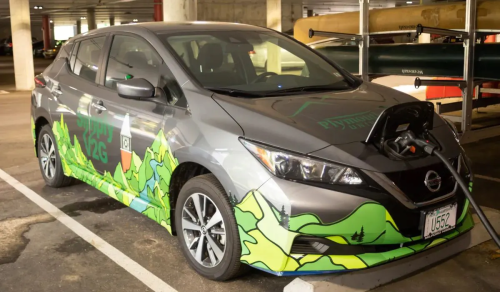
Two Nissan LEAF electric vehicles (EVs) at the Plymouth State University (PSU) provided 1 MWh of energy to the PSU’s ALLWell Center, offsetting some of the building’s electricity needs, over a six-month period.
The university is taking part in an utility rate program developed by its local utility New Hampshire Electric Cooperative (NHEC), electrification software provider Bellawatt, and Fermata Energy.
The program at PSU brings together EVs, a bidirectional EV charging system, and advance notice on hourly electricity pricing—called a Transactive Energy Rate (TER)—enabling the university to make decisions easily about using the Nissan LEAF batteries as mobile energy storage assets.
Under the program, PSU sent energy stored in the EVs’ onboard batteries to offset the ALLWell Center’s building load for approximately 90 hours during a 6-month period.
Through the NHEC application, TER forecasts electricity pricing one day in advance. Daily alerts about the next day’s hour-by-hour electricity prices are sent by NHEC to Fermata Energy’s AI-powered bidirectional charging platform, which then analyzes those rates, simplifies the information, and advises PSU about times the vehicles can discharge the batteries to maximize value for the university. The university controls whether to discharge by parking the EVs and plugging them into the Fermata Energy bidirectional charger.
The day-ahead electricity pricing enables PSU to buy electricity from the New Hampshire Electric Cooperative at low prices and store that energy in the EV batteries. When the price of electricity is higher, PSU can then discharge the batteries and sell the energy back to NHEC. This is known as electricity arbitrage. The successful outcome of this hourly electricity pricing program creates a pathway for NHEC to compensate its members for power exported from Distributed Energy Resources, such as EV batteries and solar.
The Nissan LEAF is one of the few EVs currently on the road and able to participate in bidirectional charging. Fermata Energy’s bidirectional charging platform manages the EV’s state of charge, sends alerts to customers, and allows fleet owners to both charge and discharge EV batteries.
Until recently, commercial fleet EV operators could only use unidirectional chargers, meaning the power went from the grid to the EV, costing the EV owner money. Unidirectional charging is also an unpredictable electricity demand that utilities need to manage and plan for. Bidirectional charging changes that dynamic.
Fermata Energy’s platform can also monitor building load data, helping to manage electricity usage better. Fermata Energy has V2X bidirectional programs working in several New England utilities, including Green Mountain Power, Eversource, and Rhode Island Energy. These programs have proven effective at offsetting surging customer demand by dispatching power from customer-owned batteries.







